With retail establishments opening up in phases across Mumbai, fashion store owners look at colleagues in other metros, global examples and dip into their own imagination to create a shopping experience like never before, literally

At Bengalurus House Of Angadi, one of the first textile and lifestyle outposts to have reopened after lockdown, clients have to wear face masks, undergo a temperature check, and follow mandatory sanitisation of handbags of no more than 15 inches at the sa
Last month, House of Angadi, Bengaluru-s heritage textile and lifestyle outpost, opened its doors to customers after a six-week lockdown. An Instagram post by the store clarified what its high-profile customers could expect when they came by for a shopping experience. No more than two clients per service area, distribution of waiting tokens, and the suggestion to leave handbags in the car and simply carry a payment card. Its founder K Radharaman has seen clients follow the regulations since they resumed operations on May 4.
ADVERTISEMENT
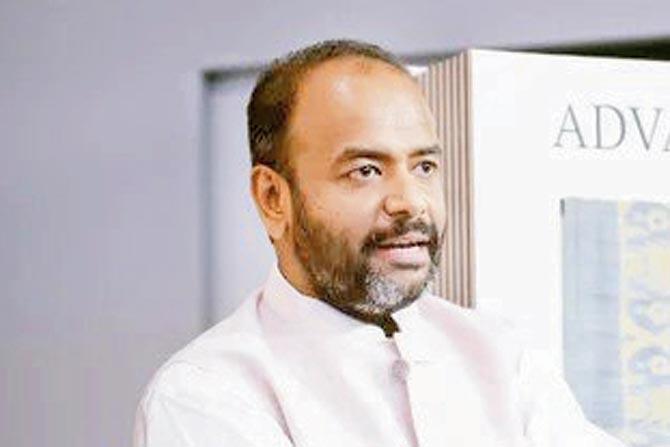
K Radharaman
As of last Friday, shops selling consumer discretionary goods and services have been given the go-ahead to reopen in Mumbai as part of phase one of the lifting of the lockdown. Stores will operate on odd-even day basis, although malls are going to have to wait a little longer to open. This means, that after other metros Delhi, Hyderabad, Bengaluru, Mumbai-s designer stores are going to have to devise new rules of retail.
It seems then that the biggest trend of this season is not the embracing of a specific look, but a collective expression of solidarity—we are all in this together. And the question on everyone-s mind is common too—what next?
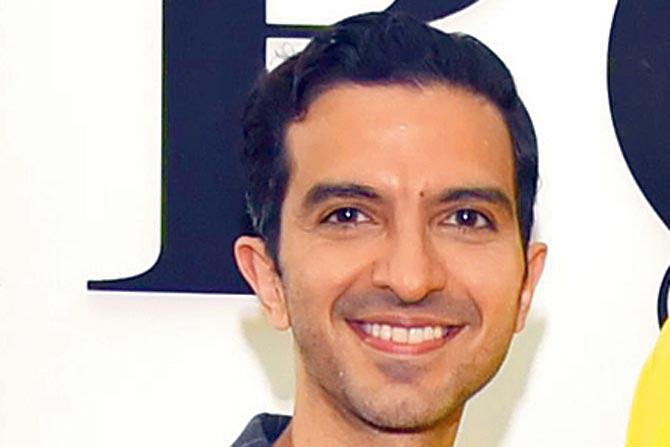
Imran Amed
"There are many challenges, the biggest of which is simply getting people to feel safe and secure when going back to the stores," writes Imran Amed in an email interview. London-based founder, editor-in-chief and CEO of The Business of Fashion, Amed suggests that stores communicate clearly about the measures being taken. "Better to over communicate about the measures in owned channels and in-store," he says.

Anchal Jain
But safety aside, opening up fashion retail is going to be a rethinking of merchandising, a sharper product mix, combined with latest AR tools to deliver a more personalised, immersive, emotional and seductive customer experience including winning back trust amongst the customers to touch, try and buy clothing, according to Anchal Jain, founding partner at Val-More Action Advisory and faculty co-chair at Creative & Cultural Businesses, IIM Ahmedabad. With an entrepreneurial and academic experience that spans 30 years in the lifestyle industry, Jain has built brands in India and Europe, participating closely in the value chain management, including trend forecasting and data analysis.
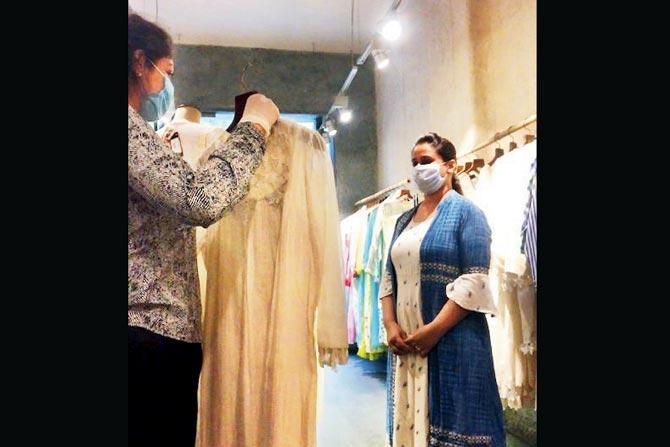
"Apart from putting mandatory safety measures in place, we have also divided our staff into teams of three to prevent exacerbating the risk of disease," says Tina Tahiliani Parikh of Ensemble India
As Mumbai-s standalone fashion businesses invent new strategies and seek fresh motivation to encourage a pandemic-era retail experience, the roster of rules is ready. Experience gained at her multi-brand store in Delhi-s Khan Market will come handy for Tina Tahiliani Parikh when she opens her flagship Mumbai outpost, Ensemble at Lion Gate. "Apart from putting mandatory safety measures in place, we have also divided our staff into teams of three to prevent exacerbating the risk of disease," says the executive director at Ensemble India. Clients wearing a mask will follow a temperature check with an IR thermometer before entering the store, and maintain physical distancing, as the staff mans sanitisation stations and oversees frequent cleaning of high-frequency touch points. All clothing items that have been touched will be quarantined, for anywhere between 24 to 72 hours, and later steam ironed. The staff will wear face masks and gloves at all times, and submit to health checks.
Mumbai-based designer Manish Malhotra unlocked the doors to his flagship bridalwear stores in Hyderabad and Delhi on May 22. And it-s luckily because both happen to be spread over 15,000 sq ft that it will be easier for the staff to accommodate clients even while following the new physical distancing norms. "We are however, making structural changes at our Mumbai stores where we sell our bridal wear [7,000 square feet] and diffusion line [2,000 square feet], to create more space and promote one-way traffic," Malhotra says.

Tina Tahiliani Parikh
While standalone stores are gradually figuring how to work around the limitations, multi-brand and experience malls like Lower Parel-s Palladium and High Street Phoenix HSP are prepping to meet new norms. "We will always welcome a discerning set of customers, and they need to be informed that as a matter of fact, malls are safer than standalone stores. The customers will expect us to deliver on the government-s safety guidelines," says Gayatri Ruia, development director at Palladium and HSP.

Gayatri Ruia
Like the Shopping Centre of India has created guidelines for malls, the Retailers Association of India has also introduced specific mandates for retailers, Ruia informs, which start right at the warehouse till the goods are invoiced and delivered to customers. Since Palladium and HSP house mostly international brands, including Burberry, Gucci, Emporio Armani, Bottega Veneta, Jimmy Choo, Tod-s along with high street retail chains Zara and H&M, the brands, on their part, will activate strict controls and SOPs to ensure customer safety.

While Manish Malhotra-s Hyderabad and Delhi stores are spread across 15,000 sq ft and allow for physical distancing, the Mumbai stores—bridal and diffusion line—under 7,000 sq ft are undergoing structural changes to create more space and one-way traffic
For the common areas of the malls, including the food court, Ruia says entry will be controlled as per government guidelines see box. "We are also installing a special software that will offer us a sense of real time customer density inside the mall, which will be integrated with the mall CCTV," she adds.

Manish Malhotra
Maybe we-re all going to remain six feet apart for months to come. Rather than exchange germs, we-ll shop online, video call the stores instead of visiting, pay electronically instead of handling cash. But the fashion retail players are beginning to sense a shift in mood, both a settling in for the long haul and the impatience of getting on with business. Those may seem to be paradoxical impulses, but they lead to a similar place: a slight weakening of the virus- stranglehold on people-s resolve. "We can either lose time moaning about what is not anymore or think about what can be. Rare are the moments when you can shape the future; this is one such time," Jain says over email.
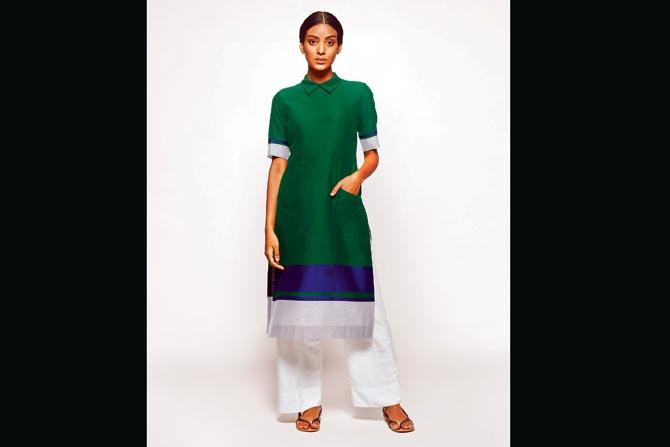
Payal Khandwala design
This rare moment has also compelled designers to have significant discussions around the purpose of fashion. "Designers have to slow down. Consumers are changing their relationship with consumption; they do not want more. It-s also time to imagine a new business model where sales at the till cannot be the ultimate goal for a designer. The onus is on us to ask: what does fashion actually mean now?" feels Malhotra.
There is a great advantage in buying locally by ethical labels, suggests Tahiliani Parikh. "Across our stores and website, we are encouraging customers to see value in conscious consumption; buy less, buy better. Our stylists are also offering tips on how to rewear an outfit by accessorising and styling it differently." Jain agrees. It-s sustainable and mindful brands that will dominate and become more transparent and demanding. He shares, "A sustainable brand can also be hedonistic in its values and still connect with the customers if its tone and content is honest and authentic."

Payal Khandwala has introduced a virtual shopping service that allows clients to shop at her store without leaving their homes
Radharaman says it-s only a matter of time before we see the positives emerge from the pandemic. "A case of over commodisation had made way for imitation production. Overall, I think, this crisis will lead to a trimming of the herd. Only those players with a serious, sustainable approach to the business will survive."
Radharaman-s outposts have been functioning in keeping with WHO-recommended safety norms. "Client traffic at our three physical stores is 50 per cent.
It-s not bad, I would say, given the situation," he adds on an optimistic note.
Fashion buying will never be the same. But then, it seems that nothing will. Customers are not pouring in like before, observes Malhotra. "They are making enquiries and requesting that we send images [of designs] rather than visiting the store. We-ve seen a similar sentiment online. The buying season will pick up only in October."
Payal Khandwala reopened her Bengaluru store two weeks ago, but clients remain hesitant to step out. She expects similar trepidation when her Mumbai stores pull up the shutters. "Shopping is not going away, but it-s definitely changing," Khandwala says. The Mumbai-based designer has introduced a virtual shopping service where clients can call in with their requirements, mentioning details down to the fabric. Her staff then photographs outfit options displayed on hangers and mannequins. Once the selection is made either over the phone or online, the outfits are couriered, free of cost. "It is our way of extending a little personal shopping experience, and doing so virtually seems like an efficient way right now."
The country-s leading bi-annual fashion showcase, LakmeÌÂÂ Fashion Week LFW is in the midst of introducing a virtual showroom; an online marketplace for designers and artisans. The online concept, a first for LFW, unfolds in two ways. The first is a B2B one-stop repository for designers to showcase their future collections to multi-designer store buyers across the world. Here, the LFW team will create a coded web design built-in with video and image uploading software and share it with participating designers. "Since B2B is a startup programme, we won-t be charging fees from designers or buyers to participate. If things go well, and it adds value to the LFW brand, we might have a conversation about charging later," says Jaspreet Chandok, head of lifestyle businesses, IMG Reliance. The other is a B2C platform, where LFW will collaborate with an e-commerce site to develop a platform for designers to sell their past and current collections directly to customers.

Jaspreet Chandok
Ruia urges retailers to redefine the role of the store to effectively cater to changing customer preferences. Make the customer feel special by allowing exclusive access to merchandise through in-store only and in-store first programmes. Furthermore divert recent uptick of online platforms to complement brick and mortar operations with a click and collect model.
Trousseau designer Sabyasachi Mukherjee has launched contactless delivery of products purchased through video conferencing. Reaching customers digitally is the obvious way forward for any brand, but Jain recommends going a step ahead to create an omni-brand. It is not just about delivering an integrated omni-channel. Instead, [create] a brand proposition in itself as 360-degree consumer experience. "I-d expect the consumers to be more picky and since trust is critical, there is an opportunity for already trusted brands to re-evaluate their value propositions and bring those to the customer in a more holistic way. This is a great time for sensible brand extensions without losing individual essence," explains Jain. There is pent-up demand, says Radharaman, but it-s directed towards need-based rather than impulse buying. So while the demand for ready-to-wear RTW has not picked up yet, with teachers, IT professionals and architects still WFH, there is a steady stream of enquiries from those who are planning their wedding, he shares. "For customers who are reluctant to step out, we have introduced by-appointment, video call facilities."

The staff will wear gloves, face masks and shields, and sanitise frequent touch points regularly
In India, a large chunk of the fashion market is the trousseau market. And wedding spenders are very different from fashion shoppers. The argument, in its simplest form, is this: weddings are an occasion so deeply embedded in our culture, that they are more resilient to blows. "I agree that they are not going anywhere, and therefore bridalwear will still remain an important market. Although like other parts of the fashion industry it is likely to contract significantly in the short-term," Amed says.
But that-s not to say that the magnitude of pomp and ceremony won-t be put on a diet of moderation. Given the need for distance, a tough economic environment and shifting values around excess and ostentation, Amed predicts weddings will likely be more intimate and less show-y, and therefore wedding parties will be smaller and simpler. So while the guest-list may slim down from 200 to 50, the bride and groom will still want to dress up for their special day. Malhotra concurs. "It-s going to be a new way of living. I can-t fly to Delhi for every appointment like before, so we are building on personalising our WhatsApp messaging and video conferencing."
"I don-t see why this [video calls] could not be possible, especially as big groups of people in a family going bridal shopping is out of the question mid-pandemic. Maybe there is a hybrid model where the bride and one family member go to the physical store and the rest of the family joins via video," Amed recommends. Radharaman has already noticed the trend of smaller groups visiting his bridalwear stores while the elders stay home. "They [trousseau customers] are not in the mood to window shop. They come well prepared with a clear idea of what they want so that they don-t spend extra time." In the absence of trial room facilities, RTW will see difficulties around fit and form but that-s not the case with the one-size-fits-all saree. "That-s one silhouette that does not need to be tried on," Radharaman says.
What to expect when malls open up
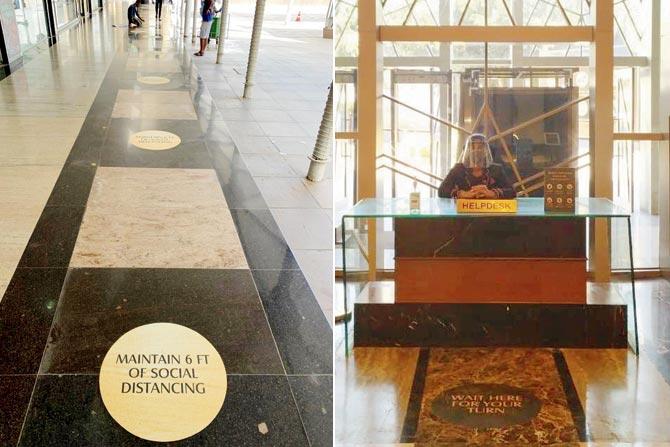
Palladium and High Street Phoenix will conduct mandatory temperature checks on customers, expect them to wait in queue while maintaining physical distancing guided by stickers and markers. Courtesy: Palladium and High Street Phoenix
- Undergo temperature checks at the entrance with contactless infrared thermometers
- Use hand sanitisers placed at multiple locations in the mall
- Stand in queue along the floor markers placed at the mall to ensure physical distancing
- UV Ray baggage scanners along with the baggage X-ray scanners, which will ensure that the bags you carry are disinfected at the mall entrance
- Contactless and digital payment
- Kiosks for purchasing of masks and sanitisers
- Floor queue marking to be followed in elevators, escalators, restrooms, F&B and other retail outlets
- Elevator buttons only to be operated by the elevator attendant
- Touch-free parking with digital payments
- Before exiting, you will place all shopping bags in a centralised UV ray disinfecting box
Catch up on all the latest Mumbai news, crime news, current affairs, and a complete guide from food to things to do and events across Mumbai. Also download the new mid-day Android and iOS apps to get latest updates.
Mid-Day is now on Telegram. Click here to join our channel @middayinfomedialtd and stay updated with the latest news
 Subscribe today by clicking the link and stay updated with the latest news!" Click here!
Subscribe today by clicking the link and stay updated with the latest news!" Click here!






